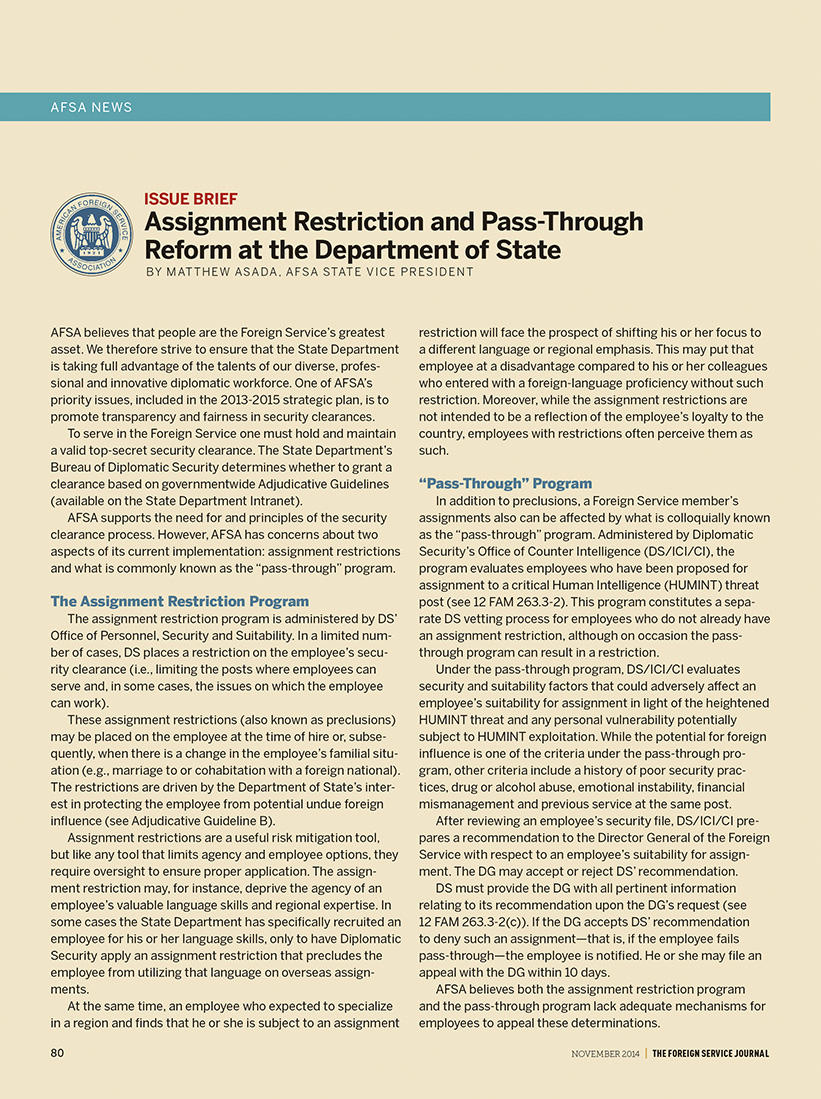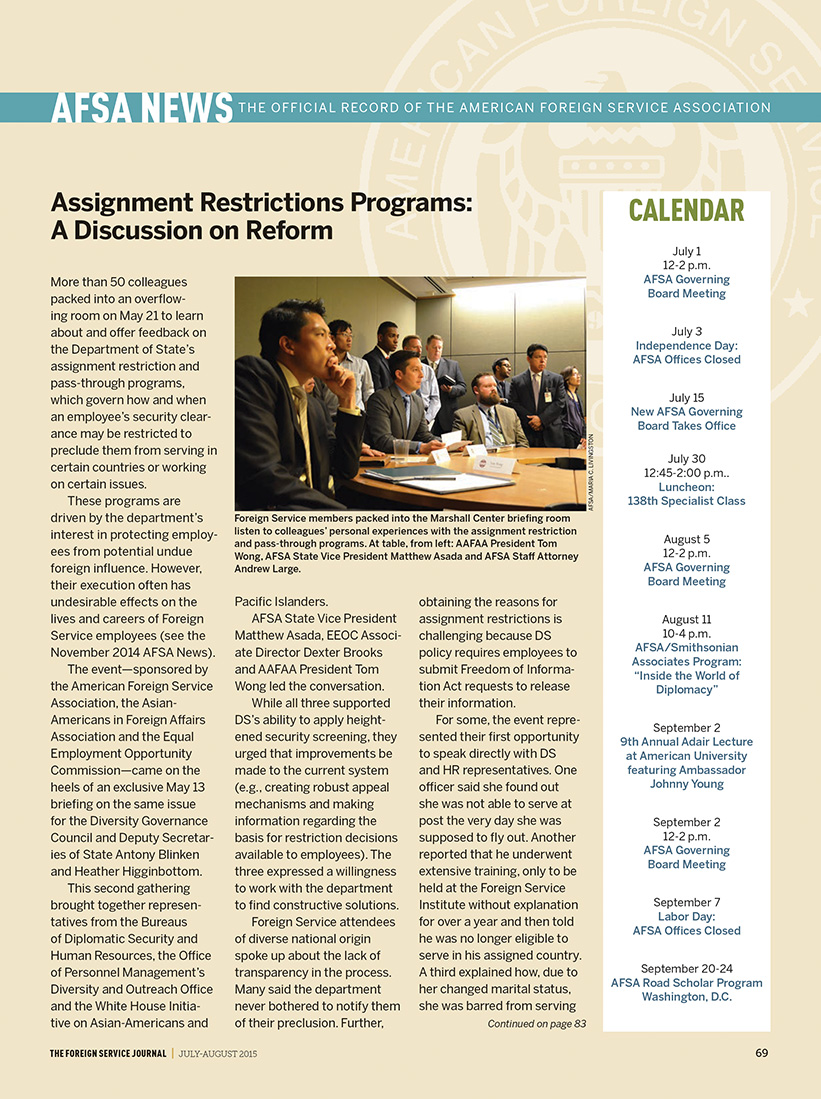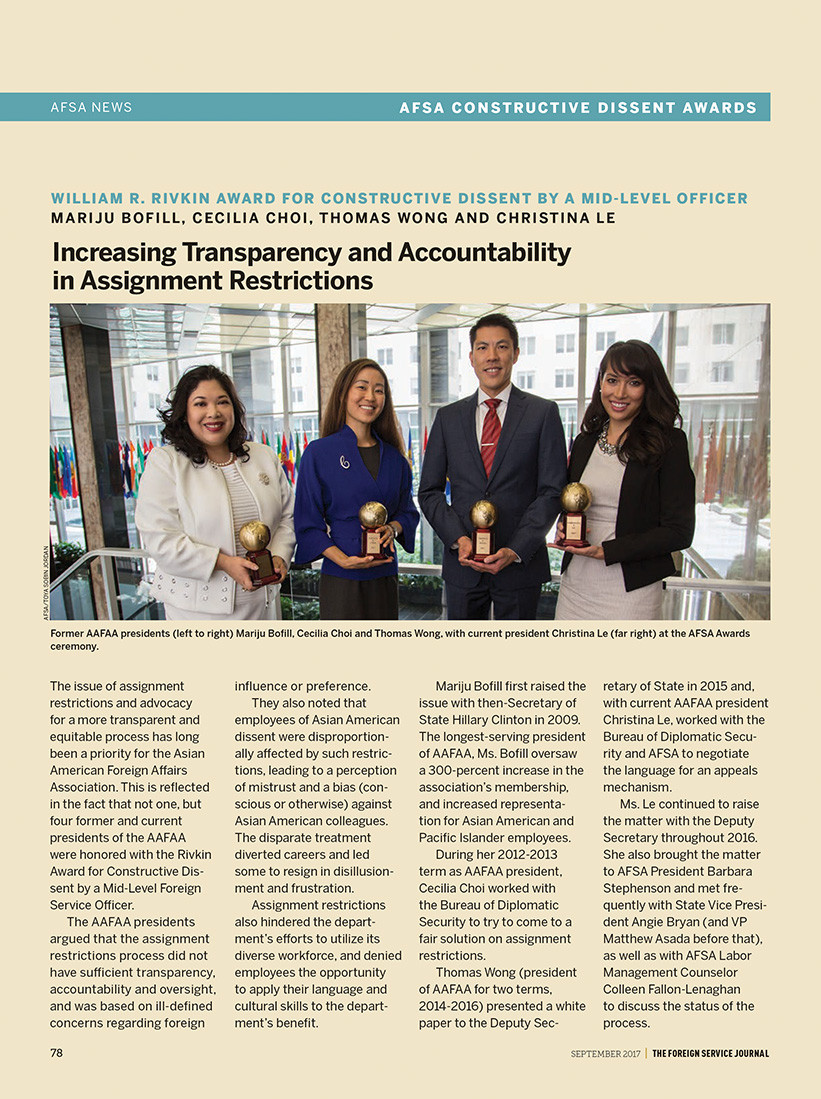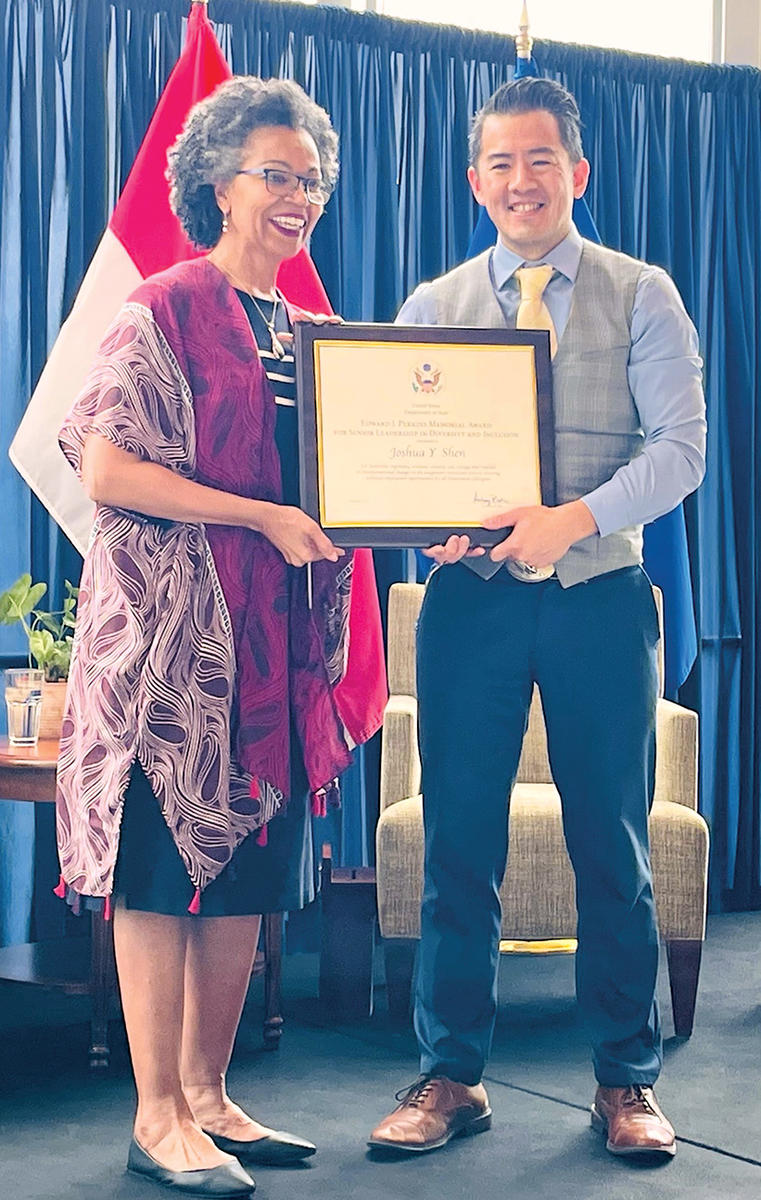A Decade-Long Campaign to Reform Assignment Restriction Programs
A central participant recounts high points of a successful reform effort at State.
BY MATTHEW ASADA
Assignment restrictions are conditions placed on an employee’s security clearance prohibiting the employee from working in a specific country or a portfolio related to a specific country. Assignment preclusions are personnel actions limiting employees from working in specific countries due to issues of privileges and immunities, often linked with an employee’s actual or potential claim to dual citizenship (3 FAM 2424.5). Assignment reviews are assessments regarding an employee’s suitability for an assignment to a critical human intelligence threat post.
For more than two decades, the assignment restriction, assignment preclusion, and assignment review (also known as “pass-through”) programs have degraded our diplomacy and prevented more than 2,000 colleagues from working in or on certain countries. For the past decade, AFSA, together with the Asian American Foreign Affairs Association (AAFAA) and other employee organizations, has waged a campaign to reform these programs.
As a result, in May 2024, the Department of State announced new AFSA-negotiated regulations implementing Section 6110 of the Department of State Authorization Act of 2023, which included the third piece of a solution to this problem and established a new employee right.
This is the story of three critical moments in this campaign. It reveals how the department’s cultural inclination to the status quo may have contributed to the continued underrepresentation of Asian Americans and Pacific Islanders (AAPI) within the Senior Foreign Service (SFS) and how employees successfully mobilized for change.
Establishing the Right to Challenge a Restriction

In November 2014, AFSA released an “Issue Brief” presenting its concerns with the process of assignment restrictions. The first mention of “assignment restrictions” in the FSJ, the brief was used to educate legislators and their staff.
AFSA / FSJ Digital Archive
The first public notice of an “assignment restriction” is Lydia DePillis’ Sept. 24, 2013, article in The Washington Post, “At the State Department, Diversity Can Count Against You.” DePillis described how department policies on assignment restrictions disproportionately affected AAPI Foreign Service officers, such as Michael Young, and how these officers had been prevented from serving in or working on Taiwan, China, and Hong Kong. As AFSA State vice president at the time, I spoke with DePillis and noted that the issue did not only affect Asian Americans, but the strength of the AAPI employee organization had brought the issue to the fore. That article spurred the initial inquiries to State on the issue from House Foreign Affairs Committee staff, whose sustained interest would prove critical.
Six years earlier, Foreign Service Officer Richard Jao had partnered with Benjamin Chiang, Mira Piplani, and Julie Turner to reconstitute the defunct Asian American employee organization at State. It was renamed the Asian American Foreign Affairs Association (AAFAA), and Mariju Bofill was recruited as its first president. In December 2010, Bofill raised the issue of assignment restrictions with Secretary of State Hillary Clinton.
AFSA, too, had been concerned by the length of time, lack of transparency, and justification for security clearance decisions. In 2006, at congressional request, the State Department’s Office of Inspector General (OIG) reviewed Diplomatic Security’s (DS) Revocation Process for Security Clearances. OIG recommended a reasonable time for convening and rendering a decision by the Security Appeals Panel (SAP)—“such as 45 days.”
Although the Foreign Affairs Manual (FAM) listed the criteria used to determine an assignment restriction (12 FAM 223.5) and a pass-through denial (12 FAM 263.3-2), additional guidance was needed governing their use, review, or appeal. In its 2011 report, OIG noted: “The practice [on assignment reviews] has been for the Director General (DG) to defer to DS.”
In September 2013, AFSA requested disaggregated demographic data from the State Department to determine whether any groups were being adversely affected. The DS assistant secretary briefed AFSA on the programs, and DS subsequently supplied some aggregate numbers of affected employees and countries of restriction. AFSA summarized its concerns for a November 2014 AFSA News Issue Brief, the first mention of assignment restrictions in The Foreign Service Journal. AFSA President Bob Silverman and I used that piece in our engagement with congressional members and staff.
Senate Foreign Relations Committee (SFRC) chairman Bob Corker (R-Tenn.) and Ranking Member Robert Menendez (D-N.J.) were supportive of improving diversity within the Foreign Service. During an April 23, 2015, hearing, Sen. Menendez said to Deputy Secretary of State for Management and Resources Heather Higginbottom: “The State Department has one of the worst records of diversity of all the federal agencies. … Assignment restrictions and preclusion programs … only exacerbate the problem.”

In May 2015, at AFSA’s invitation, officials from the Equal Employment Opportunity Commission, the Office of Personnel Management, and the White House Initiative on Asian Americans and Pacific Islanders (WHIAAPI) met with members of the Foreign Service in the Marshall Center briefing room to discuss the assignment restriction programs, as reported in the July-August 2015 AFSA News. Shown here, from left: AAFAA President Tom Wong, AFSA State Vice President Matthew Asada, and AFSA Staff Attorney Andrew Large.
AFSA / FSJ Digital Archive
By the spring of 2015, we had bipartisan language at the committee staff level for a draft State Department authorization bill that included AFSA-supported items, such as extension of some provisions of the Servicemembers Civil Relief Act and assignment restriction reform. A State Department authorization bill institutes or changes department programs, but there was no indication it would ever become law: A State authorization bill had not been passed since 2002, and many, including at AFSA and the department, were pessimistic about passage at the time.
Complementing the congressional engagement, we discussed the problem with other civil rights stakeholders in the spring of 2015. Japanese American Citizens League Executive Director Priscilla Ouchida wrote an April 22, 2015, letter to the Director General of the Foreign Service about “the lack of diversity at Embassy [Tokyo and] … whether the department’s current assignment and security clearance policies contribute to [AAPI] underrepresentation.”
A May 13, 2015, meeting of the Diversity Governance Council with then–Deputy Secretaries Antony Blinken and Heather Higginbottom proved pivotal. There, AAFAA President Tom Wong and I described the personal impact of assignment restrictions in an emotional hour-long discussion that humanized this problematic personnel policy, which led to the department’s first policy review of the issue. Days later, at AFSA’s invitation, Equal Employment Opportunity Commission (EEOC) Director of Federal Sector Programs Dexter Brooks, OPM Acting Diversity and Inclusion Program Manager Sharon Wong, and White House Initiative on Asian Americans and Pacific Islanders (WHIAAPI) staff member Maureen Tariq visited the State Department for a May 21, 2015, conversation on assignment restriction programs.
About a year later, in October 2016, President Barack Obama put forth a “Memorandum on Promoting Diversity and Inclusion in the National Security Workforce,” which included a directive to national security agencies to implement a review process for decisions related to assignment restrictions. And the State Department issued a brand-new FAM section instituting a higher-level review in November 2016, but did not authorize an appeal (see the September 2017 FSJ).
The story would have ended there had Sen. Corker not succeeded in an 11th-hour maneuver. On Dec. 5, 2016, he obtained the Senate’s unanimous consent for a bipartisan Department of State Authorities Act, Fiscal Year 2017, which included a new statutory right to appeal any assignment restriction (Section 414) and a mandate that State report on the number and nature of employees affected by the assignment restrictions in the previous three years.
The Semantics of an Independent Appeals Process

Four presidents of the Asian American Foreign Affairs Association won AFSA’s 2017 William R. Rivkin Award for Constructive Dissent by a Mid-Level Officer for their work to reform the assignment restriction programs at State, as reported in the September 2017 AFSA News. Shown here, from left: Former AAFAA presidents Mariju Bofill, Cecilia Choi, and Thomas Wong, with current President Christina Le at the AFSA Awards ceremony.
AFSA / FSJ Digital Archive
In 2018, when transmitting its required report on employees affected by assignment restrictions, the State Department noted: “HFAC [House Foreign Affairs Committee] do[es] not believe that [12 FAM 233.5] fully adheres to the legislative requirements.”
That year, I had been elected president of the 800-member AAFAA. Our board’s focus was “full implementation of an independent appeals process.” On Feb. 22, 2019, we sent Deputy Secretary of State John Sullivan Jr. a letter requesting that the department fully implement the statutorily required independent appeals process. The response—“AAFAA tries to draw a semantic distinction between the law’s use of the word ‘appeal’ vice the department’s use of the word ‘review’”—indicated that this was not going to be easy.
Secretary of State Mike Pompeo’s State Department had a record number of AAPIs at senior levels: At one time, three AAPIs were serving in the six under secretary positions. While the political leadership was supportive, progress at the working- and senior career-staff level remained slow. AAFAA built coalitions with the other race, ethnicity, and national-origin employee organizations. In May, we sent the department three diversity issue papers requesting barrier analyses, improved data, and review of the Foreign Service assignments process’s impact on workforce diversity. And at AAFAA’s 10th anniversary celebration in May 2019, Acting Under Secretary for Public Diplomacy and Public Affairs Michelle Giuda shared her Vietnamese American story to underscore the power of narratives.
On July 25, 2019, the House passed the FY19 State Authorization (HR 3352) on a bipartisan basis. The legislation included Section 311, a mandate to fully implement an independent appeals process, but the bill died at the end of that congressional session. In a July 31, 2019, letter to State, HFAC Chair Rep. Eliot Engel (D-N.Y.) and SFRC ranking member Sen. Menendez urged more transparency and oversight and underscored their commitment to seeing this employee right fully implemented.
One of the reasons for the success of this multiyear campaign has been the continued involvement of AAFAA leaders. In June 2020, former AAFAA President Christina Le and several AAFAA members affected by assignment restrictions briefed Deputy Secretary of State Stephen Biegun on the issue. Several months later, Biegun established an internal taskforce to review assignment restrictions and audit all existing cases.
To inform the discussions, newly elected AAFAA President Tina Wong sent a July 27, 2020, information memorandum to the Bureau for East Asian and Pacific Affairs (EAP) describing bias and errors in the application of assignment restrictions that had come to light through AAFAA’s 2020 assignment restriction survey spearheaded by AAFAA members and others. Wong and AAFAA’s senior adviser met with the under secretary of State for management, Director General of the Foreign Service, and Diplomatic Security in early September to discuss these concerns.
AAFAA President Shirlene Yee and Vice President Liz Liu wrote about the association’s “Historic Year of Advocacy” in the October 2021 issue of State Magazine. That historic year of advocacy and outreach had resulted in articles in CNN, Politico, and The Hill. CNN reporter Nicole Gaouette profiled Rep. Andy Kim (D-N.J.), whose own assignment restriction while a State Department employee “felt like a very clear signal … that they didn’t trust me fully.” In December 2021, AAFAA, now led by Liz Liu, sent EAP a final memo, “Assignment Restrictions’ Negative Impact on EAP Staffing, Capabilities, and Public Messaging.”
To address the continuing employee concerns, HFAC Chair Gregory Meeks (D-N.Y.) and ranking member Rep. Michael McCaul (R-Texas) again added assignment restriction appeal language to the Department of State’s 2021 Authorization Act. The legislation, which confirmed the independent appeal and established a 60-day decision timeline, was signed into law (PL 117-81).

Secretary of State Antony Blinken attends a virtual roundtable with the Asian American Foreign Affairs Association, moderated by AAFAA President Shirlene Yee (at left), at the State Department in July 2021.
Courtesy of State Magazine
Confirming the Employee Right
The 2021 legislation mandated a report on “a rationale for the use of assignment restrictions by the Department of State” (22 USC 2734e). The data, shared exclusively with Congress, indicated that even after more than 60 percent of all restrictions were lifted, Asian Americans were proportionally three times as likely as white colleagues to have a restriction.
On March 23, 2023, Secretary Blinken announced the end of new assignment restrictions and a process for employees to appeal existing assignment restrictions. In an internal email to employees, he said the change “allows us to unlock the full potential of our workforce while upholding the highest standards of security,” according to a report in The Washington Post. Unfortunately, this policy decision did not end the process of assignment reviews (aka pass-throughs) nor did it provide employees with an independent appeals mechanism for the assignment reviews.
AAFAA and AFSA’s sustained decade-long advocacy and congressional action led to major policy discussions, an internal audit, and a reduction in the number of active assignment restrictions from more than 2,000 in 2020 to 636 in 2023, potentially freeing up almost 10 percent of the diplomatic workforce to redeploy around the world.
As State wound down its use of new assignment restrictions, however, AAFAA received reports that members were increasingly being held up in the pass-through process, which had been retained. In 2010, according to the 2011 OIG report on the DS Office of Investigations and Counterintelligence, three of 700 employees had failed pass-through; by contrast, according to a Nov. 21, 2023, letter from the under secretary of management, in 2022 nine of 391 failed. AAFAA held firm in its belief that the 2016 legislation required State to institute the appeals process for pass-throughs as well. As AFSA State vice president at the time, I negotiated the text with congressional staff to ensure the appeal rights would apply to any type of assignment restriction.
Congressman Ted Lieu (D-Calif.) continued his focus on the issue as well. At a June 13, 2023, hearing with State’s Chief Diversity and Inclusion Officer Ambassador Gina Abercrombie-Winstanley, he raised the issue of assignment restrictions and their impact on morale and diplomatic readiness. The previous year Lieu and Reps. Andy Kim (D-N.J.), Joaquin Castro (D-Texas), and Chrissy Houlahan (D-Pa.) had introduced HR 5275, the Accountability in Assignment Restrictions Act.
President Biden signed the Department of State Authorization Act of 2023 into law on Dec. 22 of that year. Its Section 6110 provides employees with an independent appeals process for any assignment restriction or assignment review; codifies the Security Appeals Panel (SAP) as the final, independent appeals mechanism; and includes an annual reporting requirement on the cumulative number of individuals impacted by assignment restrictions as well as any pending assignment restriction or review open for more than 30 days.
Lessons and Next Steps

On a 2023 visit to Jakarta, Chief Diversity and Inclusion Officer Ambassador Gina Abercrombie-Winstanley presents the State Department’s 2022 Edward J. Perkins Memorial Award for Outstanding Leadership in Diversity and Inclusion to a member of the Asian American Foreign Affairs Association for advocacy work on assignment restrictions and pass-through reforms.
Courtesy of AAFAA
This campaign, like previous personnel reforms, was successful because we raised awareness through media and external partners, engaged career and political leadership at the department, and educated congressional partners on potential legislative fixes. In her 2023 oral history for the Association for Diplomatic Studies and Training, AFSA’s General Counsel Sharon Papp proudly notes that AFSA’s advocacy on assignment restrictions had resulted in a “big, big win.”
In 2024 AFSA Vice President Tina Wong successfully negotiated the implementation of the new law. Both 12 FAM 230 and 12 FAM 260 specify that SAP membership includes the Office of Civil Rights and confirm that the State Department will not apply any new assignment restrictions to the workforce.
With the new statutory right, implementing regulation, and reporting requirements, it is perhaps time for an external (OIG or GAO) review of these programs as the last one was conducted in 2011. This should include workload analysis, examination of the demographic composition of DS program staff, and assessment of the security clearance adjudicative guidelines, which may assume widespread foreign influence and blackmail concerns without sufficient supporting data.
Also, the State Department has acknowledged that Asian Americans are underrepresented at the SFS levels. Asian Americans were represented at Department of Labor–defined reasonable entry- and mid-levels (6.61 percent) but underrepresented at the Senior Foreign Service levels (2.36 percent) in 2012. Data from State’s own online interactive “Demographic Baseline Report” notes that Asian Americans are underrepresented in the SFS as compared to their representation at other grades, suggesting a barrier analysis is needed to identify why and how best to address.
Meanwhile, a Jan. 2, 2024, New York Times front-page article, “Asian American Officials Cite Unfair Scrutiny and Lost Jobs in China Spy Tensions,” reminds us that the problem persists more broadly. Several employees from across the foreign affairs and national security agencies who were approached for the article declined to speak, not wanting to “rock the boat” and afraid of adverse career consequences, including fears of retaliation related to their current assignments or security clearances.
It is worth remembering that the progress made so far at the State Department started when one young diplomat, who had exhausted all internal efforts to redress his grievance, found the courage to speak out publicly. Michael Young’s 2013 interview in The Washington Post helped spur the AAFAA and AFSA campaigns and subsequent congressional action. We at State joined our voices together, each with his own personal motivation. For my part, I spoke up then and now to honor my Japanese American grandparents, who were born as American citizens yet deprived of their constitutional liberties during World War II.
But a colleague said it best, speaking for us all: “I spoke out because I know that the Department of State can do better … and I felt I had a moral obligation. The department needs to acknowledge an inconvenient truth, that race has been and is a factor in these decisions.”
When sharing or linking to FSJ articles online, which we welcome and encourage, please be sure to cite the magazine (The Foreign Service Journal) and the month and year of publication. Please check the permissions page for further details.
Barrier Analysis at State
Barrier analysis—required by equal employment opportunity (EEO) management directives but rarely conducted by the State Department across multiple administrations—involves the identification and analysis of obstacles to diversity and equal opportunity and the development of appropriate remedies.
Both the Government Accountability Office (GAO) and State’s Office of Inspector General (OIG) had identified concerns with State’s Office of Civil Rights (S/OCR), responsible for barrier analysis, repeatedly over the years (in 1989, 1993, and 2006).
In a 2016 deposition, Director of the Office of Civil Rights John Robinson confirmed that barrier analysis was not done as required by the Equal Employment Opportunity Commission and recommended by GAO in its 1989 report.
In 2020 GAO concluded in its report “State Department: Additional Steps Are Needed to Identify Potential Barriers to Diversity” that the department “should look at the longstanding issues … and do a better job of addressing barriers to equal opportunity in its workforce.” —M.A.
Read More...
- “In Pursuit of Transparency in Assignment Restriction Policies” by Christina T. Le and Thomas T. Wong, The Foreign Service Journal, September 2017
- “Asian Americans Can No Longer Be Silent, and Neither Should You” by Kim Bissonnette, The Foreign Service Journal, July-August 2021
- “Asian American Officials Cite Unfair Scrutiny and Lost Jobs in China Spy Tensions” by Edward Wong and Amy Qin, The New York Times, December 2023




